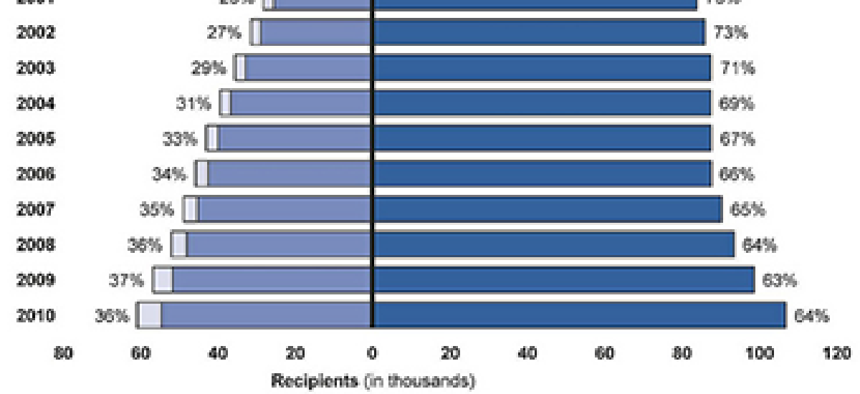VA paperless benefits rollout gains speed

In 2012, the first 18 VA offices switched to the new Veterans Benefits Management System, and the rest are expected to this year.

GAO found that the number of younger veterans receiving benefits is growing. (GAO graphic)
The Department of Veterans Affairs is in the continual process of rolling out the Veterans Benefits Management System (VBMS), and the Hartford, Conn. office is leading the way. In September, the Connecticut office was the first to switch over to VBMS, and "the digital, paperless system now used in 18 locations around the nation, is to be fielded in all 56 offices by the end of" 2013 The Washington Post reported.
According to the VA, VBMS is a way for the agency to cut down the average processing time when a Veteran files a claim, on average from 240 days to 119. The $537 million system was implemented in part due to a backlog of paperwork "of claims filed by veterans seeking disability benefits has soared in recent years as troops have returned from Iraq and Afghanistan and because of a policy change making it easier for Vietnam veterans to file Agent Orange-related claims," The Washington Post reported in a July 2012 story.
In order to go all-paperless, the VA will have to scan and extract data from the current paper claims, a daunting task that the VA apparently has no detailed plans for, according to services representatives. Other problems include older veterans continuing to file on paper and slow software systems.
In April 2012, FCW reported on a hearing in which veterans’ representatives said getting rid of the claims backlog should not be the only priority. Jeffrey Hall, assistant national legislative director for Disabled American Veterans, said that reforms for the VA should dig deeper.
"While the elimination of the backlog will be a welcome milestone, we must remember that eliminating the backlog is not necessarily the same goal as reforming the claims processing system, nor does it guarantee that veterans are better served," Hall said. "The backlog is a symptom, not the root cause."
NEXT STORY: How to make the most of a mentor


